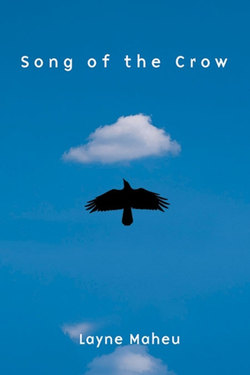Читать книгу Song of the Crow - Layne Maheu - Страница 17
На сайте Литреса книга снята с продажи.
ОглавлениеI was in the habit of wandering around in our garden every evening with a gun, on the lookout for crows—I’d long cherished a hatred for the wary, sly, rapacious birds . . . (the crows recognized me, and merely cawed spasmodically at a distance).
—IVAN TURGENEV, First Love
10. Lone Crow
In clearer weather I was still stranded, but managed to make a safe and comfortable home out of the tree where the wind had taken me. For rest I found a cleft between two branches, despite the tree rodent’s disapproval. Up here I could hop up the ladder of perches and finally see the world. I saw the sky where the trees leaned and where the clouds wondered. I saw where the river slid to every day in a lazy way that said, Come follow. And up here branches always wavered, bristling with danger. Songbirds never stopped prattling in their sweet, mindless anxiety, and large birds saw too much.
Up here I actually liked to watch Keeyaw fell trees. So did other crows—strange, meandering onlookers from foreign woods, here to take note of the changing geography of the trees. A loose, shifting daytime roost had gathered just beyond Keeyaw’s attack on the Giants. Then, right beside me, a stealthy presence made the branch dip.
At first it pleased me because I thought one of my siblings had come with food. But the more I looked, the more worried I became. I knew it wasn’t a raven, being too small and nasty and full of ragged feathers. Its dull, matted coat lacked the luster of my family’s, and there was a sleepy, greedy, half-opened look to the eyes. When the strange crow who’d been swinging his head in all directions finally looked at me, I had the sinking feeling it wanted to eat me.
“Hungry, are you, I Am?” He cawed my name with mocking derision.
“How do you know my name?”
The strange bird gave no answer but bobbed and shrugged nervously.
I said, “Keep to yourself. Unless you’re the Old Bone. Then I have business with you, for I Am the Misfortune.”
“Oh. I see. I thought it took seasons beyond counting for the Misfortune to appear.” The bird laughed to himself, or coughed, or gurgled, I couldn’t tell. “Great dangers, feats of daring. A little egg like you?” The bird’s laugh was a strange, derelict wheeze that seemed idle and corrupt. If this bird couldn’t learn the sounds of a crow, then how could it ever imitate nature? “But, your worshipfulness, your eyes are still blue. You can’t even fly—” the bird leered wickedly, “—or so it seems. And that wispy bit of fuzz on your face—”
“How do you know all of this?” I asked. “Are you the Old Bone?”
“Me? Oh, no, not me.”
The strange bird bobbed and pecked at the bark for no reason. It cringed. It pecked its own claws. Its eyes spun, then crossed. It shivered, startled by nothing.
“Then watch how you treat me,” I said. “For I bring bad tidings.”
“You’re better off watching yourself. A Misfortune only brings bad tidings upon itself.”
“Why should I believe you? Do you know of the Old Bone?”
“Keeyaw! Keeyaw!” the strange bird called out, as if his wits had flown off. “Keeyaw is the one to watch out for. A bird’s curse is nothing next to his.”
I perched there silently, listening to the far-off chopping of Keeyaw, hoping the bird would leave me, or at least be silent, too.
“Of course. Every crow knows of the Old Bone,” he said. “But few know him.”
“Have you seen him?”
“All birds see the Old One, flapping around, flap, flap. But few see him.”
Just then Plum Black sounded distantly in the woods.
“Aawwwk.” The strange crow tried to sing like my family, but from him, it was disgusting and embarrassed me. I’d heard the mockery before while I was in the nest and always wondered where it came from. Maybe the bad part of a dream.
Then Fly Home’s rage warp sounded from the trees.
And the Lone Crow took off when my father shot past in a wheeling attack and followed him through the branches.
Directly afterward, my sister Plum Black lit beside me. “You didn’t eat anything from him, did you?”
“No.”
“He wanted to feed you. He watches where we hide food and steals it.”
“If he steals, why would he give it back?”
“He wants to be like your Plum Black and live in Our Mother of Many’s song.”
“Why?”
“He is lost, a Lone Crow, without family or song.”
“How could he ever join our family, born from another nest?”
“I am from another nest.”
“And from another song?”
“Yes. But I learned your mother’s song well enough that hers became my own. And in her old motherhood, she thought I was one of hers. First setting eyes on me, she called me Plum Black, and I’ve been Plum Black ever since. When it came time to feed you, your father did not chase me off either. But I grow too old to feed another’s. Soon I will be chased off. I will become the Lone Crow.”
“How will it end?”
“With the season of my own nest, I hope.”
“I will come to feed your nestlings,” I said.
“You say that now.”
And Plum Black, the Beauty of our aerie, lifted easily into the air.
“C’mon,” she said. “Hurry. The winds won’t wait.”
She flew off.
In the distance, my father continued his complaint, warning all Lone Crows and those of other songs to be wary.
